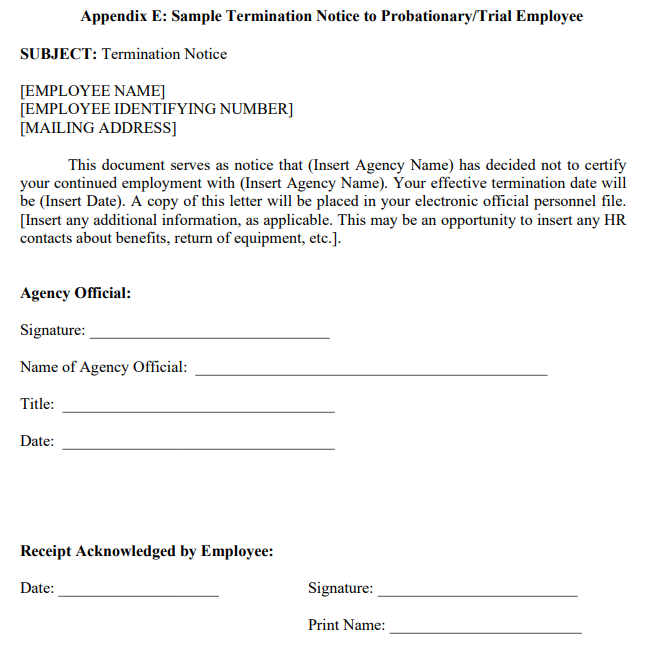Politics
OPM outlines expectations, timeline for agencies to adopt Trump’s changes on probationary employees

Agencies are facing a roughly two-week deadline to show the Trump administration how they plan to implement coming changes for probationary employees.
By May 16, agencies are expected to report their plans for adding a new “affirmative” certification requirement for probationary employees. Agencies are also expected to detail how they intend to train supervisors and HR practitioners on the coming changes, according to new guidance the Office of Personnel Management published Tuesday.
The guidance outlines more detailed expectations for agencies to update how they manage probationary periods following President Donald Trump’s executive order last Thursday. That order called for the creation of “Civil Service Rule XI” and added a hurdle for probationary employees to clear before they become tenured employees. Agencies will now be required to review and actively sign off on probationary workers’ continued employment before they can reach a tenured employment status.
“Agencies are to use probationary and trial periods as an extension of the hiring process that requires agency certification before employees continue their federal employment beyond the probationary or trial period,” OPM’s new guidance reads.
OPM also specified the four key factors agencies need to consider when deciding whether a probationary employee should keep their job:
- An employee’s performance and conduct
- Needs and interests of the agency
- Whether the employee’s continued employment would advance organizational goals of the agency or the government
- Whether the employee’s continued employment would advance the efficiency of the service
Under current regulations, probationary employees can only be removed from their jobs for performance or conduct. But OPM now states that “agencies may decide not to finalize a probationer’s employment for reasons unrelated to their personal performance or conduct, such as the operational needs of the agency.”
Additionally, if agencies decide to remove probationary employees based on one of those reasons, they no longer need to tell probationary employees why they are being let go. Only the effective date has to be disclosed to probationary employees, which could be as soon as “immediately.”
“There is no longer a requirement that the employing agency provide a terminated probationer with ‘the agency’s conclusions as to the inadequacies of his performance or conduct,’” the guidance states.
OPM’s guidance also includes several new templates agencies can give to probationary employees, depending on whether they are approved for continued service once they reach the end of their probationary period. The template for probationary employees who get terminated aligns with the new directions that agencies no longer have to give a reason for a termination.
Template of termination notice to probationary employee. (Source: Office of Personnel Management)
The updates stemming from the executive order also remove a requirement for agencies to notify probationary employees in the competitive service “of the reasons for a proposed adverse action when it is based on pre-appointment conditions,” OPM wrote in Tuesday’s guidance.
Moving forward, probationary employees will also have to meet with an agency head — or a designee — prior to the end of the probationary period to discuss the prospects of their continued employment. The new guidance will apply to employees whose probationary periods end on or after July 23, OPM said.
“I do at least hope that these decisions get put back in the supervisor’s hands,” Debra D’Agostino, a partner at Federal Practice Group, said in an interview last week. “This should be a supervisory decision because the supervisor is the one actually working with this employee, seeing this employee’s work, knowing if this person’s performance is up to snuff and if they are a good fit with the role. This should not be a decision made by OPM.”
The changes come after tens of thousands of probationary employees were terminated from their jobs on the basis of “performance.” Agencies’ rationale for letting go of probationary employees resulted in multiple lawsuits that led to the employees’ initial reinstatements, many of which were later walked back.
OPM also plans to set the regulations for how and when probationary employees can appeal their terminations, according to the new guidance.
“The director of OPM may by regulation prescribe circumstances under and procedures by which employees terminated from a probationary or trial period may appeal such termination,” OPM wrote. “Except as otherwise required by law, such appeals shall be the sole and exclusive means of appealing terminations during probationary or trial periods.”
The post OPM outlines expectations, timeline for agencies to adopt Trump’s changes on probationary employees first appeared on Federal News Network.
Politics
Black Lives Matter Activist in Boston Pleads Guilty to Federal Fraud Charges – Scammed Donors to Fund Her Lifestyle

Screencap of YouTube video.
A Black Lives Matter activist in Boston named Monica Cannon-Grant pleaded guilty to federal charges this week, admitting that she scammed donors and used their money to fund her own lavish lifestyle.
Cannon-Grant was previously held up as an admired figure. The city of Boston named her the Bostonian of the year at one point for her ‘social justice activism’ and she was even recognized by the Boston Celtics basketball team for her efforts.
She is now facing a minimum of two years in prison.
The New York Post reports:
BLM-linked activist admits conning donors to fund her lavish lifestyle
A once-celebrated Boston social activist has pleaded guilty to defrauding donors — including Black Lives Matter — out of thousands of dollars that she used as a personal piggy bank.
Monica Cannon-Grant, 44, pleaded guilty Monday to 18 counts of fraud-related crimes that she committed with her late husband while operating their Violence in Boston (VIB) activists group, according to the US Attorney’s Office in Massachusetts.
The activist scammed money — including $3,000 from a BLM group — while claiming it was to help feed children and run protests like one in 2020 over the murder of George Floyd and police violence.
Cannon-Grant also conned her way into getting $100,000 in federal pandemic-related unemployment benefits — which she used to pay off her personal auto loan and car insurance policy.
But she has now confessed to transferring funds to personal bank accounts to pay for rent, shopping sprees, delivery meals, visits to a nail salon — and even a summer vacation to Maryland.
Just amazing.
Monica Cannon-Grant stole from donors, scammed the government, and lived it up while preaching about oppression. BLM grift is the only nonprofit where fraud is part of the mission statement. https://t.co/ir3q9lqYrh
— Matthew Newgarden (@a_newgarden) September 23, 2025
BREAKING: BLM activist Monica Cannon-Grant pleads guilty to 27 fraud charges, misusing over $1M from Violence in Boston for personal gain. Echoes Sir Maejor Page’s $450K scam conviction. A wake-up call for nonprofit accountability. pic.twitter.com/N9vvD369gB
— (@pr0ud_americans) September 14, 2025
Here’s a local video report:
She should pay back every penny.
The post Black Lives Matter Activist in Boston Pleads Guilty to Federal Fraud Charges – Scammed Donors to Fund Her Lifestyle appeared first on The Gateway Pundit.
Politics
Keith Olbermann Backpedals Furiously With Apology for Threatening CNN’s Scott Jennings – Jennings Responds (VIDEO)

As the Gateway Pundit reported yesterday, former MSNBC host and generally unhinged leftist Keith Olbermann, appeared to threaten CNN’s conservative pundit Scott Jennings on Twitter saying, ‘You’re next motherf**ker.’
Well, Olbermann may have gotten a phone call or a visit from the FBI because today he walked back those comments with a full-throated apology.
RedState has an update:
To quickly recap, Scott Jennings, a Salem Media Network radio host and conservative CNN political commentator, reacted to breaking news on Monday that Kimmel had been reinstated by tweeting, “So basically his employer suspended him for being an insensitive pr**k, and we don’t live in an authoritarian regime? Got it.”
This enraged Olbermann, who proceeded to tweet what many, including Jennings, perceived to be a threat. “You’re next, motherf**ker. But keep mugging to the camera.” Jennings tagged Patel and included a screengrab of the tweets in response.
Though the FBI hasn’t commented as to whether an investigation was launched, Olbermann ostensibly appears to have thought twice about what he tweeted and deleted, apologizing profusely in tweets posted on Tuesday and claiming what he wrote was “misinterpreted”:
See Olbermann’s tweet below:
I apologize without reservation to @ScottJenningsKY
Yesterday I wrote and immediately deleted 2 responses to him about Kimmel because they could be misinterpreted as a threat to anything besides his career. I immediately replaced them with ones specifying what I actually meant. pic.twitter.com/SPWLb73nEk
— Keith Olbermann (@KeithOlbermann) September 23, 2025
I oppose and condemn political violence, and the threat of it. All times are the wrong time to leave even an inadvertent impression of it – but this time is especially wrong
I should've acknowledged the deletion and apologized yesterday. I'm sorry I delayed.
— Keith Olbermann (@KeithOlbermann) September 23, 2025
Scott Jennings, always a class act, offered this hilarious response:
SCOTT JENNINGS: “Marking myself SAFE from that NUT, Keith Olbermann!” pic.twitter.com/EYZX6vm5Oh
— Dustin Grage (@GrageDustin) September 23, 2025
Keith Olbermann really needs help. The guy is just so out of control.
The post Keith Olbermann Backpedals Furiously With Apology for Threatening CNN’s Scott Jennings – Jennings Responds (VIDEO) appeared first on The Gateway Pundit.
Politics
Where is Lance Twiggs? Kirk Assassin’s Transgender Lover Has Vanished

 Charlie Kirk assassin Tyler Robinson and roommate Lance Twiggs
Charlie Kirk assassin Tyler Robinson and roommate Lance Twiggs
Charlie Kirk assassin Tyler Robinson lived with his transgender partner – a male-to-female trans named Lance “Luna” Twiggs.
The FBI used Robinson’s texts with his transgender partner to solidify that Robinson was the assassin. Lance Twiggs has not been charged with any crime; however, federal authorities are still investigating.
Last week, Utah authorities released the text exchange between Tyler Robinson and his transgender lover, Lance Twiggs, sent shortly after Kirk’s assassination.
Utah County District Attorney Jeff Gray announced seven charges against Charlie Kirk assassin Tyler Robinson. They will also be seeking the death penalty.
Robinson was charged with:
– Count 1: Aggravated murder (capital offense)
– Count 2: Felony reckless discharge of a firearm causing bodily injury
– Count 3: Felony obstruction of justice for hiding the firearm
– Count 4: Felony obstruction of justice for discarding the clothing he wore during the shooting
– Count 5: Witness tampering for asking roommate to delete incriminating messages
– Count 6: Witness temperating for demanding trans roommate stay silent, and not speak to police
– Count 7: Commission of a violent offense in the presence of a child
Jeff Gray released the chilling texts between Tyler Robinson and his “love” Lance Twiggs.
Read the text exchange here:
 Tyler Robinson texts with transgender lover Lance Twiggs / 1
Tyler Robinson texts with transgender lover Lance Twiggs / 1
 Kirk assassin Tyler Robinson texts with transgender lover Lance Twiggs / 2
Kirk assassin Tyler Robinson texts with transgender lover Lance Twiggs / 2
Lance Twiggs was reportedly cooperating with the FBI, however, according to the Daily Mail he has seemingly vanished.
“If [Lance Twiggs] ever comes back, it will be in a body bag,” a neighbor said to the Daily Mail. “That’s not a threat – I’m just saying that there are so many people who want a piece of him he’d be mad to show his face in public again. This was a generational event.”
The Daily Mail reported:
The Trans boyfriend of Charlie Kirk’s alleged assassin has fled their former lovenest – and locals tell the Daily Mail they never want to see him again.
Lance Twiggs, 22, was led away for questioning when police swooped on the smart three-bed condo he shared with accused gunman Tyler Robinson, 22.
Shaken neighbors say the part time plumber has not been back to the $320,000 property in St. George, Utah – one declaring: ‘Good riddance. I never want to see either of them again.’
His beaten-up Infinity compact is still parked in his space with his work gear tossed across the back seat and a sandwich wrapper and a drink on the front passenger seat.
Upstairs lights have been left on for more than a week and notes and Amazon packages are piling up outside the home owned by Twiggs’s devout Mormon family.
The post Where is Lance Twiggs? Kirk Assassin’s Transgender Lover Has Vanished appeared first on The Gateway Pundit.
-

 Entertainment6 months ago
Entertainment6 months agoNew Kid and Family Movies in 2025: Calendar of Release Dates (Updating)
-

 Entertainment3 months ago
Entertainment3 months agoBrooklyn Mirage Has Been Quietly Co-Managed by Hedge Fund Manager Axar Capital Amid Reopening Drama
-
Tech6 months ago
The best sexting apps in 2025
-

 Entertainment5 months ago
Entertainment5 months agoKid and Family TV Shows in 2025: New Series & Season Premiere Dates (Updating)
-

 Tech7 months ago
Tech7 months agoEvery potential TikTok buyer we know about
-
Tech7 months ago
iOS 18.4 developer beta released — heres what you can expect
-

 Tech7 months ago
Tech7 months agoAre You an RSSMasher?
-

 Politics7 months ago
Politics7 months agoDOGE-ing toward the best Department of Defense ever



